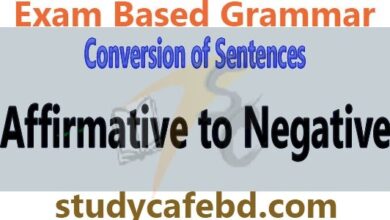Voice কাকে বলে, কত প্রকার ও Voice পরিবর্তনের নিয়ম?
Table of Contents
Voice কি বা কাকে বলে ও Voice Change এর নিয়ম
Verb প্রকাশের রুপকেই ইংরেজিতে Voice বা বাচ্য বলে।
Verb এর প্রকাশ ভঙ্গিই বলে দেয় কর্তা নিজে কাজটি করে, না কর্তর দ্বারা কাজটি করানো হয়।
Voice দুই প্রকার
যথা:
-
Active Voice (কর্তৃবাচ্য)
-
Passive Voice (কর্মবাচ্য)
Active Voice কাকে বলে?
কোন Sentence এ যদি Subject সক্রিয় হয়ে কোন কাজ সম্পাদন করে তখন তাকে Active Voice বলে ।
যেমন:
- I play football.
ব্যাখা: উপরের বাক্যে Subject, I এখানে সক্রিয় তাই বাক্যটি Active Voice.
More example:
- I eat rice.
- He writes a letter.
- Rakib reads a book.
- We are playing football.
Passive Voice কাকে বলে?
যে বাক্যে Subject নিজে কাজ না করে অন্যের দ্বারা কাজটি সম্পাদান করে, তাকে Passive Voice বলে।
যেমন:
- Rice is sold here.
ব্যাখা: উপরের বাক্যে Rice কিন্তু নিজে বিক্রি করছে না। অর্থাৎ প্রথম বাক্যের মত verb এর কাজটি Subject করছে না। Rice কে বিক্রি করা হয়। তাই বাক্যটি Passive Voice.
Structure: Object + be verb + verb এর past participle+ by+ subject.
Example:
- The work is done by me.
More examples:
- Breakfast is prepared at 6 O’clock.
- Mobile phone is made in China.
- Jute is exported from Bangladesh.
Active থেকে Passive করার নিয়ম
- Active Voice এর Object টি Passive Voice এর Subject রুপে বসে।
- Tense ও Subject এর Number ও Person অনুসারে to be verb বসে।
- মূল verb এর Past Participle বসে।
- Preposition (By, to, at, with, in) বসে।
- Active Voice এর Subject টি Passive Voice এর Object রুপে বসে।
Subjective and Objective form of noun/pronoun
[su_table responsive=”yes”][su_table]| Subject | Object |
| I | Me |
| You | You |
| She | Her |
| We | Us |
| He | Him |
| They | Them |
| It | It |
| Hasan | Hasan |
✔️Active Voice এর Subject + tense অনুসারে auxiliary verb + মূল verb এর past participle form + by + Active voice এর Subject কে Object এ রুপান্তর করতে হবে।
যেমন:
Active: I write a book.
Passive: A book is written by me.
Voice পরিবর্তন এ Auxiliary Verb ব্যবহারের নিয়ম
Indefinite Tense এর ক্ষেত্রে
Present Indefinite: Am, is, are.
Past Indefinite Tense: Was, were
Future Indefinite Tense: shall be, will be
Continues Tense এর ক্ষেত্রে:
Present Continues: am being, is being, are being
Past Continues: was being, were being.
Future Continues: shall be being, will be being.
Perfect Tense এর ক্ষেত্রে:
Present Perfect: Have been, has been.
Past Perfect: had been
Future Perfect: shall have been, will have been.
Tense অনুযায়ী Active Voice কে Passive Voice এ পরিবর্তন করার নিয়ম
Present Indefinite Tense অনুসারে Voice পরিবর্তন করার নিয়ম
Present Indefinite Tense যুক্ত Active Voice কে Passive voice এ পরিবর্তন করার নিয়ম:
Active Voice টির Object টি Subject হয় + am/is/are বসে + মুল verb এর Past participle form + by বসে + Active Voice এর Subject টির Objective form বসে।
যেমন:
Active: I do the work.
Passive: The work is done by me.
Active: We are playing cricket.
Passive: Cricket is being played by us.
Present Continues Tense অনুসারে Voice পরিবর্তন করার নিয়ম
Present Continues Tense যুক্ত Active Voice কে Passive voice এ পরিবর্তন করার নিয়ম:
Active voice এর Object টি Subject হয় + am being/ is being/ are being বসে + মুল verb এর Past participle বসে + by + Active voice এর subject এর Objective form বসে।
যেমন:
Active: I am doing the work.
Passive: The work is being done by me.
Present perfect tense অনুসারে Voice পরিবর্তন করার নিয়ম
Present Perfect Tense যুক্ত Active voice এর Passive Voice করার নিয়ম:
Active voice এর Object টি Subject হয় + Have been/ has been + মুল verb এর Past participle বসে + by + Active voice এর Subject টির Objective form বসে।
যেমন:
Active: I have done the work.
Passive: The work has been done by me.
Past Indefinite Tense অনুসারে Voice পরিবর্তন করার নিয়ম
Past Indefinite Tense যুক্ত Active Voice কে Passive Voice এ পরিবর্তন করার নিয়ম:
Active voice এর Object টি Subject হয় + was/were বসে + মুল verb এর Past participle বসে + by + Active voice এর Subject টির Objective form বসে।
যেমন:
Active: I did the work.
Passive: The work was done by me.
Past Continues Tense অনুসারে Voice পরিবর্তন করার নিয়ম
Past Continues Tense যুক্ত Active Voice কে Passive Voice এ পরিবর্তন করার নিয়ম:
Active voice এর Object টি Subject হয় + Was being/ were being + মুল verb এর Past participle বসে + by + Active voice এর Subject টির Objective form বসে।
যেমন:
Active: I was doing the work.
Passive: The work was being done by me.
Past Perfect Tense অনুসারে Voice পরিবর্তন করার নিয়ম
Past Perfect Tense যুক্ত Active Voice কে Passive Voice এ পরিবর্তন করার নিয়ম:
Active voice এর Object টি Subject হয় + Had been + মুল verb এর Past participle বসে + by + Active voice এর Subject টির Objective form বসে।
যেমন:
Active: I had done the work.
Passive: The work had been done by me.
Future Indefinite Tense অনুসারে Voice পরিবর্তন করার নিয়ম
Future Indefinite Tense যুক্ত Active Voice কে Passive Voice এ পরিবর্তন করার নিয়ম:
Active voice এর Object টি Subject হয় + shall be/ will be + মুল verb এর Past participle বসে + by + Active voice এর Subject টির Objective form বসে।
যেমন:
Active: I shall do the work.
Passive: The work will be done by me.
Future Continues Tense অনুসারে Voice পরিবর্তন করার নিয়ম
Future Continues Tense যুক্ত Active Voice কে Passive Voice এ পরিবর্তন করার নিয়ম:
Active voice এর Object টি Subject হয় + shall be being/ will be being + মুল verb এর Past participle বসে + by + Active voice এর Subject টির Objective form বসে।
যেমন:
Active: I shall be doing the work.
Passive: The work will be done by me.
Future Perfect Tense অনুসারে Voice পরিবর্তন করার নিয়ম
Future Perfect Tense যুক্ত Active Voice কে Passive Voice এ পরিবর্তন করার নিয়ম:
Active voice এর Object টি Subject হয় + shall have been/ will have been + মুল verb এর Past participle বসে + by + Active voice এর Subject টির Objective form বসে।
যেমন:
Active: I shall have done the work.
Passive: The work will have been done by me.
Modal verbs অনুসারে Voice পরিবর্তন করার নিয়ম
May, Might, Can, Could, Must, Ought to, Going to যুক্ত Active Voice কে Passive voice এ পরিবর্তন করার সময় এদের পরে be বসে এবং তারপরে মূল verb টির Past Participle বসে।
যেমন:
Active: He may help you.
Passive: You may be helped by him.
Imperative Sentence অনুসারে Voice পরিবর্তন করার নিয়ম
Imperative Sentence যুক্ত Active voice কে passive voice এ পরিবর্তন করার নিয়ম: ( শুধু মাত্র verb দিয়ে যুক্ত Active voice কে passive voice এ পরিবর্তন করার নিয়ম)
গঠন: Let + Object টি Subject রুপে বসে + be বসে + মূল verb টির Past Participle বসে।
যেমন:
Active: Do the work.
Passive: Let the work be done.
✔️Let + ব্যাক্তিবাচক Object ( me, us, you, them, him, her) যুক্ত Active voice কে passive voice এ পরিবর্তন করার নিয়ম:
গঠন: Let + Object টি Subject রুপে বসে+ be বসে + মূল verb টির Past Participle বসে + by + ব্যাক্তিবাচক Object.
যেমন:
Active: Let me do the work.
Passive: Let the work be done by me.
✔️দুটি Object যুক্ত Imperative Sentence এর ক্ষেত্রে Direct Object টি যদি passive voice এর Subject হিসাবে ব্যবহৃত হয়, সেক্ষেত্রে Indirect Object এর পূর্বে for বা to বসে।
যেমন:
Active: buy me a pen.
Passive: Let a pen be bought for me.
Interrogative Sentence অনুসারে Voice পরিবর্তন করার নিয়ম
Interrogative Sentence এর Yes/No question এর ক্ষেত্রে Active voice এর ব্যবহৃত , Auxiliary verb, do/ does এর পরিবর্তে am/ is/ are, did এর পরিবর্তে was/were, shall/ will এর পরিবর্তে Shall have/ will have এবং have/has এর পরিবর্তে have been/ has been বসে।
যেমন:
Active: Do you play football.
Passive: Is football played by you?
WH words( when, what, which, who, why, where) অনুসারে Voice পরিবর্তন করার নিয়ম
কিন্তু Active voice এর ক্ষেত্রে ব্যবহৃত WH Words ( when, what, which, who, why, where) ইত্যাদি passive voice এর ক্ষেত্রে অপরিবর্তিত থাকে ।
যেমন:
Active: What do you want?
Passive: What is wanted by you?
✔️Active voice এর ক্ষেত্রে ব্যবহৃত Who এর ক্ষেত্রে by whom এবং whom এর যায়গায় who বসে।
যেমন:
Active: Who taught you English?
Passive: By whom were you taught English?
Passive voice of Intransitive verb
সাধারণত Intransitive verb এর passive voice হয় না। কিন্তু Cognate object যুক্ত Intransitive verb এর passive voice হয়।
যেমন:
Active: I ran a race.
Passive: A race was run by me
✔️Preposition যুক্ত Group verb গুলো Transitive এর ন্যয় কাজ করে বলে এদেরকে Passive voice এ রুপান্তর করা যায় ।
যেমন:
Active: He looks at me.
Passive: I am looked at by him
কোন Complement (factitive object) passive voice এর Subject হতে পারে না। এইরুপ ক্ষেত্রে মূল Object টি passive voice এ Subject হিসাবে ব্যবহৃত হয়।
যেমন:
Active: We made him chairman.
Passive: He has made chairman by us.
Quasi passive verb অনুসারে Voice পরিবর্তন করার নিয়ম
যে সকল verb, active verb হিসাবে ব্যবহৃত হয়ে passive অর্থ প্রকাশ করে তাকে Quasi passive verb বলে।
যেমন:
Active: Honey tastes sweet.
Passive: Honey is sweet when it is tested.
✔️Verb without complement.
Active: The house is building.
Passive: The house is being built.
✔️Reflexive Objective (Self যুক্ত Object)
Active: He hurt himself
Passive: He was hurt by himself.
Passive voice of complex sentences
Active: We know that he will do the work.
Passive: It is known to us that the work will be done by him.
Complex sentence এর Active voice এ একটি পুরো Clause যদি Subject/ object হিসেবে ব্যবহৃত হয় , সে ক্ষেত্রে Passive voice এ একটি পুরো Clause টিই Subject/Object হিসাবে ব্যবহৃত হবে।
যেমন:
Active: I know what he eats.
Passive: What is eaten by him is known to me.
Voice according to double objects
যেমন:
Active: Mr. Khan teaches us English.
Passive: English is taught us by Mr. Khan
Voice with different prepositions
কিছু কিছু ক্ষেত্রে Active voice এর Subject কে Object করার সময় by ছাড়া অন্য Preposition বসে।
যেমন: to, at, on, with ইত্যাদি ব্যবহৃত হয়।
যেমন:
Active: His conduct annoyed me.
Passive: I was annoyed at his conduct.
Note: নিম্নলিখিত verb গুলোর পরে passive voice করার সময় by না বসে, অন্যান্য Preposition বসে।
যেমন:
- Know= to fill, annoy, please
- Fill= with, contain
- Interest= in, charm, wonder
- surprise= at বসে।
Exception: Appear, belong, consist, continue, die, disappear, despair, issue, occur, wonder. ensue ইত্যাদি verb গুলো Intransitive হিসেবে ব্যবহৃত হয়। ফলে এদের passive voice হয় না।
যেমন:
Active: His mother (die) last year.
Passive: His mother died last year.
Passive voice for speaking and writing
✔️যেখানে Passive Voice হবে।
যখন verb এর কাজ ঐ বাক্যের Subject না করে অন্য কেউ করে তখন ঐ বাক্যকে passive voice করতে হবে।
গঠন: Subject + be verb + মূল verb এর past participle + preposition + Object.
যেমন:
- He is respected to all.
- English is taught here.
- Many books are published every year.
- English is spoken all over the world.
Note: যেখানে Passive voice বসে।
✔️যখন আমরা জানিনা কাজটি কে করছে, তখন Passive voice ব্যবহার করতে হয়।
যেমন:
- They have been punished.
✔️যখন কোন আবিস্কার খুব পরিচিত মনে হয়, তখন Passive voice ব্যবহার করতে হয়।
- We have been invited to the party.
✔️Habitual action বুঝালে সাধারণত Passive voice ব্যবহার করতে হয়।
- Rice is grown in Bangladesh.
Some passive voices which are used in practical life
- By the permission of authority, 1000 taka was spent for the entertainment by Hasan.
- Said amount of money my be paid by the sanction of the authority.
- Manager’s opinion may be taken about this matter.
- He has been warned many times about his negligence/ bad practice.
| Tense | To be/ to have | example |
| Present Indefinite | am, is, are + verb P.P |
Act: We play football Pass: Football is played by us. |
| Past Indefinite | was/were + verb P.P |
Act: We played football. Pass: Football was played by us. |
| Future Indefinite | shall be/ will be + verb P.P |
Act: We shall play football. Pass: Football will be played by us. |
| Present Continues | am being/ is being/ are being + verb P.P |
Act: We are playing football. Pass: Football is being played by us. |
| Past Continues | was being/ were being + verb p.p |
Act: We were playing football. Pass: Football was being played by us. |
| Future Continues | shall be being/ will be being+ verb P.P |
Act: We will be playing football. Pass: Football will being played by us. |
| Present Perfect | Have been/ has been + verb P.P |
Act: We have played football. Pass: Football has been played by us. |
| Past Perfect | Shall have been/ will have been +verb P.P |
Act: We had played football. Pass: Football had been played by us. |
| Future Perfect | shall have been/ will have been + verb P.P |
Act: We will have played football. Pass: Football will have been played by us. |
| Going on Future | am/ is/ are + going to be + verb P.P |
Act: We are going to buy a car. Pass: A car is going to be bought by us. |





